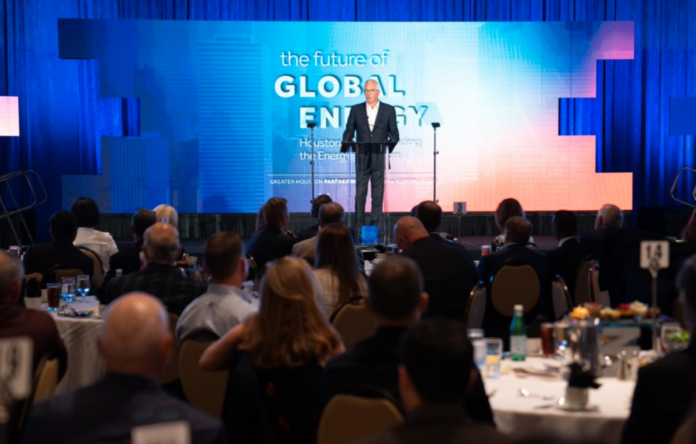
Oil and natural gas stakeholders virtually descended on Houston this week for the Future of Global Energy Greater Houston Partnership Summit. Leaders from BP, Hess, leading energy law firms, research universities, and more all came together to discuss emerging energy trends’ strengths and weaknesses. With global energy security tenuous at best presently, the panel discussions could not have been more timely.
We’ll cover some top trends the expert panelists hit on, like decarbonizing oil and gas operations, measuring and managing emissions, and truly next-generation hydrogen technology.
Decarbonizing Oil & Gas
Panel one in the decarbonization track contained a bevy of industry heavy-hitters, including Peter Evans, VP of bp America, Dan Farler, VP of Engineering at Hess Midstream, and Jack Stout, VP in Applied Intelligence at Wood Consulting. The discussion focused on reimagining energy around the planet by leveraging emerging digital technologies and advanced risk mitigation.
Key Takeaways:
- Panelists noted that the entire energy transition journey has to start somewhere, necessitating a carbon baselining today. Another significant point was the effort to eliminate routine flaring over the next few years. Interestingly, this is not as clear-cut as it might seem, as intensive machinery and systems retrofits are required globally.
- R&D shows promise with electric drilling rigs, alternative pipes, and different ways to capture and store carbon. One groundbreaking alternative Hess is looking at includes using plant root systems to absorb billions of tons of carbon each year. Still, the demand for global energy is increasing at an exponential rate, while companies are targeting net zero. In the end, all panelists agreed that oil and gas are still a part of the solution in the future.
Measuring and Managing Emissions
Panel two picked up a lot of similar themes with a focus on how to accurately measure and manage emissions going forward. The star-studded panel included: Sacha Abinader, a Managing Director with Accenture, Anne Carpenter, Partner and reporting and compliance lawyer from Baker Botts, and Kayla Ball, the Chief Product Officer for Validere, a tech firm focusing on physical and environmental commodities.
Key Takeaways:
- Sacha Abinader expounded on applying a digital transformation in energy with concepts like risk modeling with multi-modal data. He noted that tying together data gathering from operations, maintenance, and other areas provides a holistic view of assets. Digital transformation is an easy first step as physical assets will require extensive capital investment, retrofits, and a change to SOP.
- Anne Carpenter explained the difficulties of piecemeal regulations from authorities like the EPA, DOT, and other agencies. She explained the need for a set methodology to meet expectations. Especially in a global economy, standardization is complex but critical to managing the risk of uncertainty in the regulatory environment.
- Kayla Ball gave an interesting take based on her team’s technology solutions. Remote field operations are coming online with more regularity which helps create uniform measurements. However, data overload is never a good thing which is why an optimized plan for data capture is crucial. The correct data also helps create a defensible audit trail to ensure validity in data capture.
Next-Gen Hydrogen Tech
Jumping into the Hydrogen Track for Panel three, our session included Madhav Acharya, VP at Syzygy Plasmonics, Matteo Pasquali, Director of the Carbo Hub, and Professor at Rice University, and Elina Teplinsky-Winthrop, a partner at Pillsbury Winthrop Shaw Pittman. The panel held an interesting discussion of challenges and opportunities with new hydrogen technologies.
Key Takeaways:
- Madhav Acharya described a photocatalytic alternative to SMR that promises a 40% savings. But challenges in hydrogen are age-old, such as transportation, movement, and storage. Madhav concluded that cutting-edge production does little good if the final product is moving 10,000 miles away.
- Matteo Pasquali described new frontiers like Monolith Corp’s work with a DOE grant in Nebraska to make carbon black and hydrogen-based fertilizer without CO2. Correcting CO2 misinformation, enhancing food production, and protecting ecosystems is a win-win-win for us all.
- Elina Winthrop touched on new concepts like advanced, smaller footprints and modular nuclear reactors. Elina presented solutions available today such as low temp electrolysis, technology for tomorrow like high temp steam electrolysis, and ideas still in the works like thermal with very high temps and no electrolysis.

Tyler Reed began his career in the world of finance managing a portfolio of municipal bonds at the Bank of New York Mellon. Four years later, he led the Marketing and Business Development team at a high-profile civil engineering firm with a focus on energy development in federal, state, and local pursuits and picked up an Executive MBA from the University of Florida along the way. Following an entrepreneurial spirit, he founded a content writing agency servicing marketing agencies, PR firms, and enterprise accounts on a global scale. A sought-after television personality and featured writer in too many leading publications to list, his penchant for research delivers crisp and intelligent prose his audience continually craves.
If you would like to contact our staff writers, you can reach them at [email protected]
















